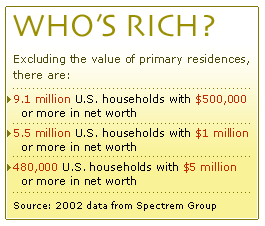
NEW YORK (CNN/Money) -
When asked what defines "rich," a lot of people say it means never having to worry about money again and working only if the mood strikes.
It's not a bad definition. But it's not an entirely truthful one either, for reasons I'll get to in a minute.
Since there are those who insist that a single number can define "rich," let's appease them first. Here are rough estimates using the typical "not-a-care-in-the-world" standard.
Blanche Lark Christerson, director of the Wealth Planning Strategies Group at Deutsche Bank, figures that for married couples with two young kids and a pricey lifestyle costing about $375,000 a year, you'd be set for life, job or no job, emergencies and all, with at least $15 million. If you're single and dependent-free, $10 million should do it.
She assumes that with potentially another 45 years ahead of them, the middle-aged rich would want to preserve capital, leave their heirs or charities something to remember them by and invest conservatively for a 3.5 percent annual return. Remember, the rich can afford to be more conservative.
If Lark Christerson's thresholds stop you in your tracks, maybe you'll like certified financial planner Jon Duncan's estimates better.
He figures that if you're married with kids in your early 40s, will live until age 90, and won't spend more than $200,000 a year, a nice little cushion would be $7.5 million. If you spend only $150,000 a year, $5 million should suffice. Or, if you can ratchet back to $100,000 a year, you'll do okay on $2.5 million.
Duncan, however, assumes a much higher rate of return (about 9.87 percent a year) and assumes you won't be upset if you can't leave your heirs much of an inheritance if any at all.
The number is beside the point
There. Satisfied? I'm not.
That's because I don't think pinning a number on "rich" is a very useful way to address the question, not to mention the annoying fact that those numbers trump nearly everybody's bottom line.

Only about 0.45 percent of households have a net worth of $5 million or more, excluding primary residences, according to the Spectrem Group, a consulting firm specializing in affluent and retirement markets. And only 0.2 percent of U.S. households have a net worth of $15 million or more, including their homes, according to the Federal Reserve.
Now you and I both know there are plenty of folks with less than $5 million (or even $1 million) who are thought to be rich. It just depends who's doing the thinking.
Robert H. Frank, a professor of economics at Cornell and author of "Luxury Fever," has noted in his work how wealth is perceived and defined in relative terms. He cites H.L. Mencken, who "defined a wealthy man as one who earns $100 a year more than his wife's sister's husband."
"Rich," in other words, is the guy in your circle who has more than you.
Money is just a part of being rich
If everything's relative, that may help explain in part why some people making six figures or more often don't consider themselves "rich" because they don't have a walk-away fund of $20 million and can tell you in great detail why $1 million isn't what it used to be.
Granted, it isn't – and it is hard to believe that you can't do more with a million bucks. But, c'mon, it's hardly chump change, even if you have to put your kids through college. Most of the world, including most of the people in this country, get by on far, far less.
There's another reason I'd argue you can't pin a number on "rich." Rich isn't just a quantitative experience. It's a qualitative one. Money is great, but only if it contributes to your sense of well-being rather than detracts from it.
| RELATED ARTICLES
|

|
|
|
|
How you choose to spend your money has something to do with how wealthy (or poor) you feel. If you're constantly confusing need with desire (desire to keep up, desire to have the latest and greatest, desire to show off), chances are you'll never feel rich enough.
What's more, when you have finally "made it" by most objective standards you may not be able to fully appreciate it.
Even though rationally those with wealth realize they're better off than most, there's an irrational piece to the puzzle for some folks who've experienced deprivation in the past or witnessed someone close to them lose a lot of money, noted Joan DiFuria of Money, Meaning and Choices, an organization that works with people who've made or acquired sudden wealth.
"They don't feel wealthy. They don't live wealthy. Their greatest fear is that they could lose it all," she said.
Lark Christerson echoed that sentiment, noting that there are some folks with $50 million who fear they'll run out of money, and others with $4 million who never worry about a thing.
At the end of the day, she said, "Rich is in the eye of the beholder. It's so purely psychological."
Jeanne Sahadi writes about personal finance for CNN/Money. She also appears regularly on CNNfn's "Your Money," which airs weeknights at 5 p.m. ET. For comments on this column or suggestions for future ones, please e-mail her at everydaymoney@cnnmoney.com.

|

